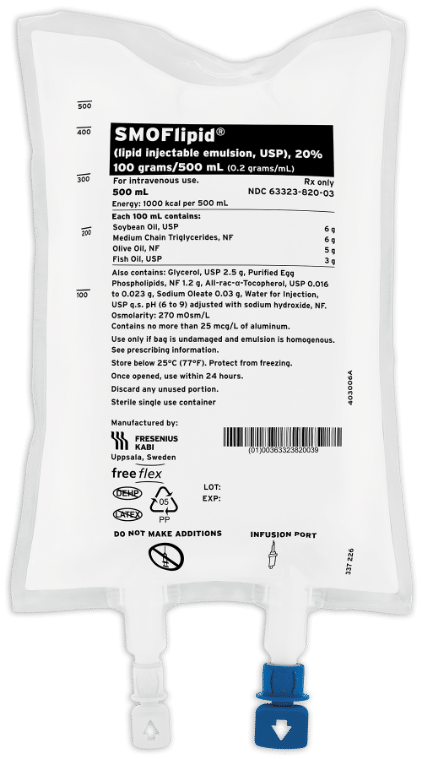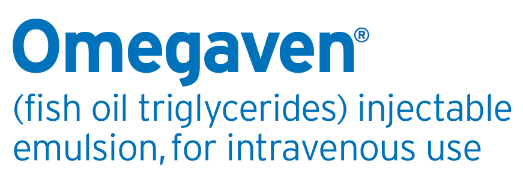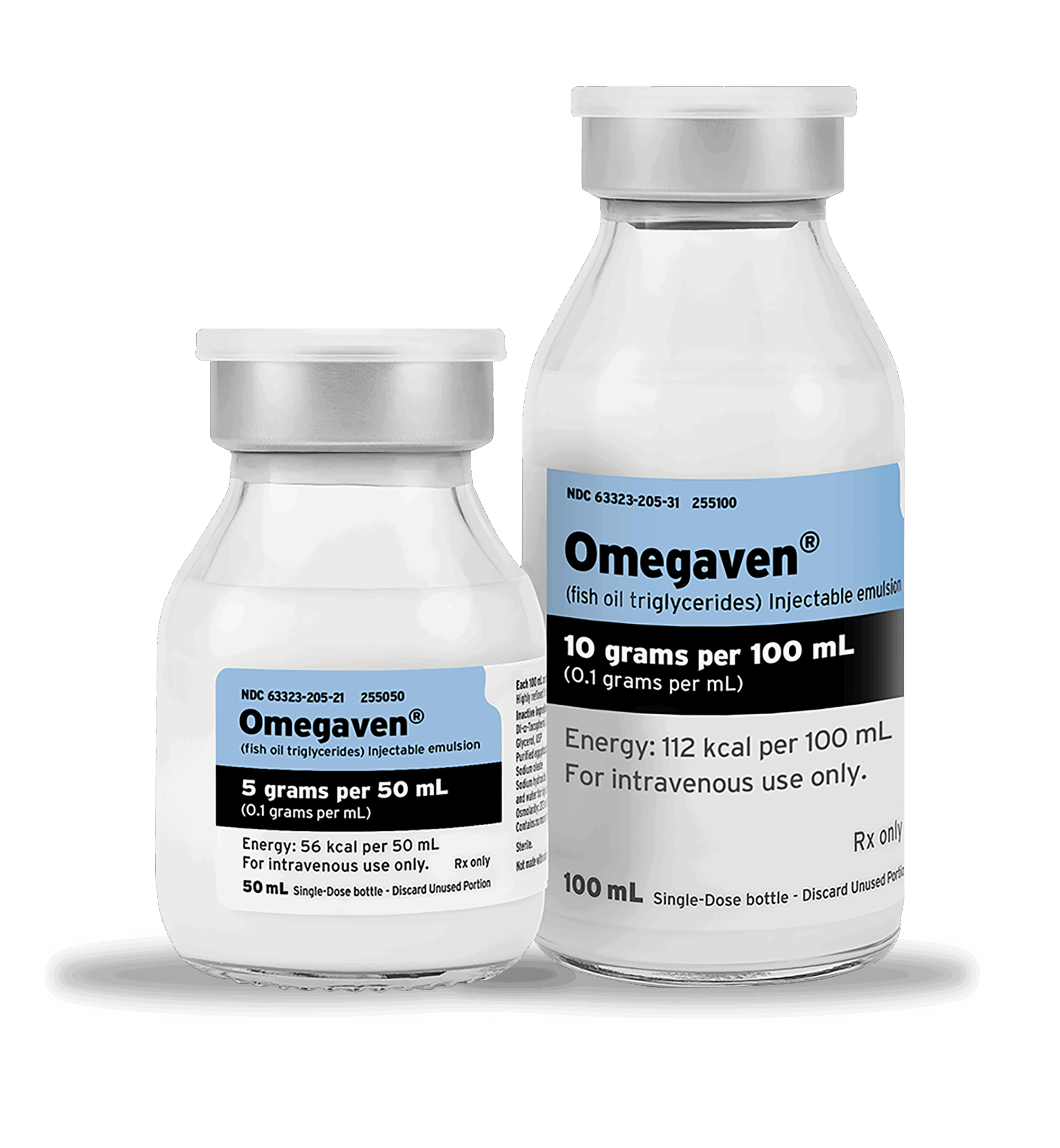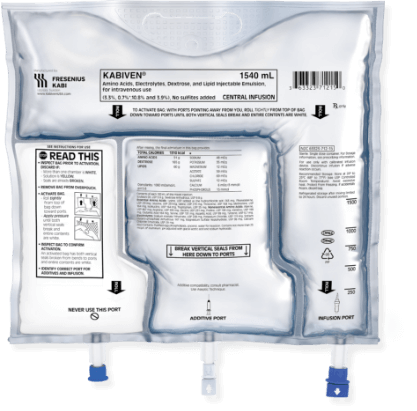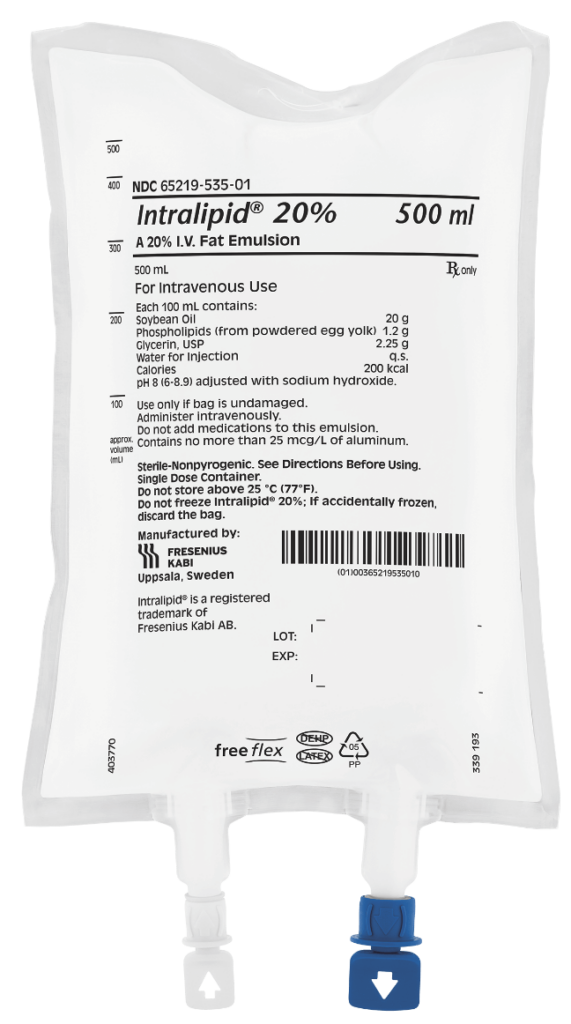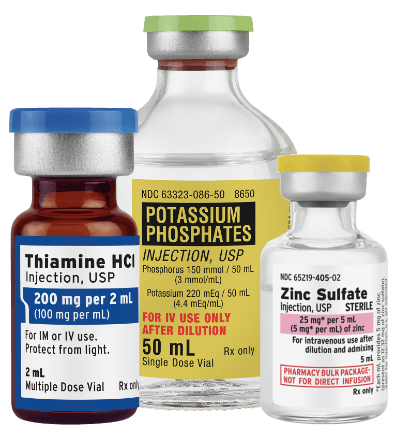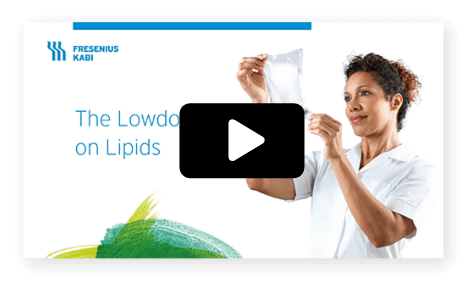Kabiven and Perikabiven may cause serious side effects including:
- Serious Adverse Reactions with Rapid Infusion of Intravenous Lipid Emulsion in Neonates and Infants: Strictly follow the recommended total daily dosage and do not exceed the maximum infusion rate. If poor clearance of fats occurs, the infusion should be stopped, and a medical evaluation started.
- Risk of Parenteral Nutrition-Associated Liver Disease: Increased risk in patients who receive parenteral nutrition for greater than 2 weeks. Your healthcare provider will monitor liver tests.
- Pulmonary Embolism (a blockage in a blood vessel in the lung) and Respiratory Distress (increased breathing rate, bluish skin color changes, wheezing) due to Pulmonary Vascular Precipitates (solid substance in the blood vessel of the lungs): If signs of lung issues occur, stop the infusion and start a medical evaluation.
- Allergic Reactions: Contact your healthcare provider immediately if you are experiencing an allergic reaction
- Precipitation (solid substance in the blood vessel) with Ceftriaxone: Do not administer ceftriaxone simultaneously with Kabiven or Perikabiven via a Y-site.
- Infection, fat overload, hyperglycemia (high blood sugar) and refeeding syndrome: Your healthcare provider will monitor you for signs and symptoms of early infection and blood levels
The most common adverse reactions for Kabiven (≥3%) are nausea, fever, high blood pressure, vomiting, decreased blood hemoglobin, decreased blood total protein, low blood potassium, and increased gamma glutamyltransferase (a liver enzyme). The most common adverse reactions for Perikabiven (≥3%) are high blood sugar, low blood potassium, fever and increased blood lipids.
To report SUSPECTED ADVERSE REACTIONS, contact Fresenius Kabi USA, LLC at 1-800-551-7176, option 5, or FDA at 1-800-FDA-1088 or www.fda.gov/medwatch.
Tell your doctor if you are taking coumarin and coumarin derivatives, including warfarin: the drug activity may be lessened and your healthcare provider will monitor your blood.
These are not all the possible side effects associated with Kabiven and Perikabiven. Call your healthcare provider for medical advice regarding Kabiven and Perikabiven side effects. You are encouraged to report negative side effects of Kabiven and Perikabiven. Contact Fresenius Kabi USA, LLC at: 1-800-551-7176 or FDA at: 1-800-FDA-1088 or www.fda.gov/medwatch. The FDA-approved product labeling for KABIVEN® (Amino Acids, Electrolytes, Dextrose, and Lipid Injectable Emulsion), for intravenous use and PERIKABIVEN® (Amino Acids, Electrolytes, Dextrose, and Lipid Injectable Emulsion), for intravenous use can be found at www.FreseniusKabiNutrition.com/KabivenPI and www.FreseniusKabiNutrition.com/PerikabivenPI.
For Healthcare Professionals
KABIVEN (Amino Acids, Electrolytes, Dextrose, and Lipid Injectable Emulsion), for intravenous use
PERIKABIVEN (Amino Acids, Electrolytes, Dextrose, and Lipid Injectable Emulsion), for intravenous use
IMPORTANT SAFETY INFORMATION
INDICATIONS AND USAGE
KABIVEN and PERIKABIVEN are each indicated as a source of calories, protein, electrolytes and essential fatty acids for adult patients requiring parenteral nutrition when oral or enteral nutrition is not possible, insufficient, or contraindicated. KABIVEN and PERIKABIVEN may be used to prevent essential fatty acid deficiency or treat negative nitrogen balance in adult patients.
Limitations of Use
Neither KABIVEN nor PERIKABIVEN is recommended for use in pediatric patients <2 years including preterm infants because the fixed content of the formulation does not meet nutritional requirements in this age group.
IMPORTANT SAFETY INFORMATION
KABIVEN is indicated for intravenous infusion into a central vein. PERIKABIVEN is indicated for intravenous infusion into a peripheral or central vein. It is recommended to mix the contents thoroughly by inverting the bags upside down to ensure a homogenous admixture. Ensure the vertical seals between chambers are broken and the contents of all three chambers for KABIVEN and PERIKABIVEN are mixed together prior to infusion. The dosage of KABIVEN and PERIKABIVEN should be individualized based on the patient’s clinical condition (ability to adequately metabolize amino acids, dextrose and lipids), body weight and nutritional/fluid requirements, as well as additional energy given orally/enterally to the patient. Prior to administration of KABIVEN and PERIKABIVEN, correct severe fluid, electrolyte and acid-base disorders. Before starting the infusion, obtain serum triglyceride levels to establish the baseline value. Do not exceed the recommended maximum infusion rate of 2.6 mL/kg/hour for KABIVEN and 3.7 mL/kg/hour for PERIKABIVEN.
KABIVEN and PERIKABIVEN are contraindicated in:
- Concomitant treatment with ceftriaxone in neonates (28 days of age or younger)
- Known hypersensitivity to egg, soybean, peanut, or any of the active or inactive ingredients.
- Severe disorders of lipid metabolism characterized by hypertriglyceridemia (with serum triglyceride concentration >1,000 g/dL).
- Inborn errors of amino acid metabolism.
- Cardiopulmonary instability
- Hemophagocytic syndrome
Clinical Decompensation with Rapid Infusion of Lipid Injectable Emulsions in Neonates and Infants: Acute respiratory distress, metabolic acidosis, and death after rapid infusion of intravenous lipid emulsions have been reported.
Parenteral Nutrition-Associated Liver Disease: Increased risk in patients who receive parenteral nutrition for greater than 2 weeks. Monitor liver tests; if abnormalities occur, consider discontinuation or dosage reduction.
Pulmonary Embolism and Respiratory Distress due to Pulmonary Vascular Precipitates: If signs of pulmonary distress occur, stop the infusion and initiate a medical evaluation.
Hypersensitivity reactions: Monitor for signs or symptoms and discontinue infusion if reactions occur.
Precipitation with Ceftriaxone: Do not administer ceftriaxone simultaneously with KABIVEN or PERIKABIVEN via a Y-site.
Infection, fat overload, hyperglycemia and refeeding complications: Monitor for signs and symptoms; monitor laboratory parameters.
The most common adverse reactions for KABIVEN (≥3%) are nausea, pyrexia, hypertension, vomiting, decreased hemoglobin, decreased total protein, hypokalemia, decreased potassium, and increased gamma glutamyltransferase. The most common adverse reactions for PERIKABIVEN (≥3%) are hyperglycemia, hypokalemia, pyrexia, and increased blood triglycerides.
To report SUSPECTED ADVERSE REACTIONS, contact Fresenius Kabi USA, LLC at 1-800-551-7176, option 5, or FDA at 1-800-FDA-1088 or www.fda.gov/medwatch.
Coumarin and coumarin derivatives, including warfarin: Anticoagulant activity may be counteracted; monitor laboratory parameters
This Important Safety Information does not include all the information needed to use KABIVEN and PERIKABIVEN safely and effectively. Please see full prescribing information for KABIVEN and PERIKABIVEN (amino acids, electrolytes, dextrose and lipid injectable emulsion), for intravenous use at www.FreseniusKabiNutrition.com/KabivenPI and www.FreseniusKabiNutrition.com/PerikabivenPI.


